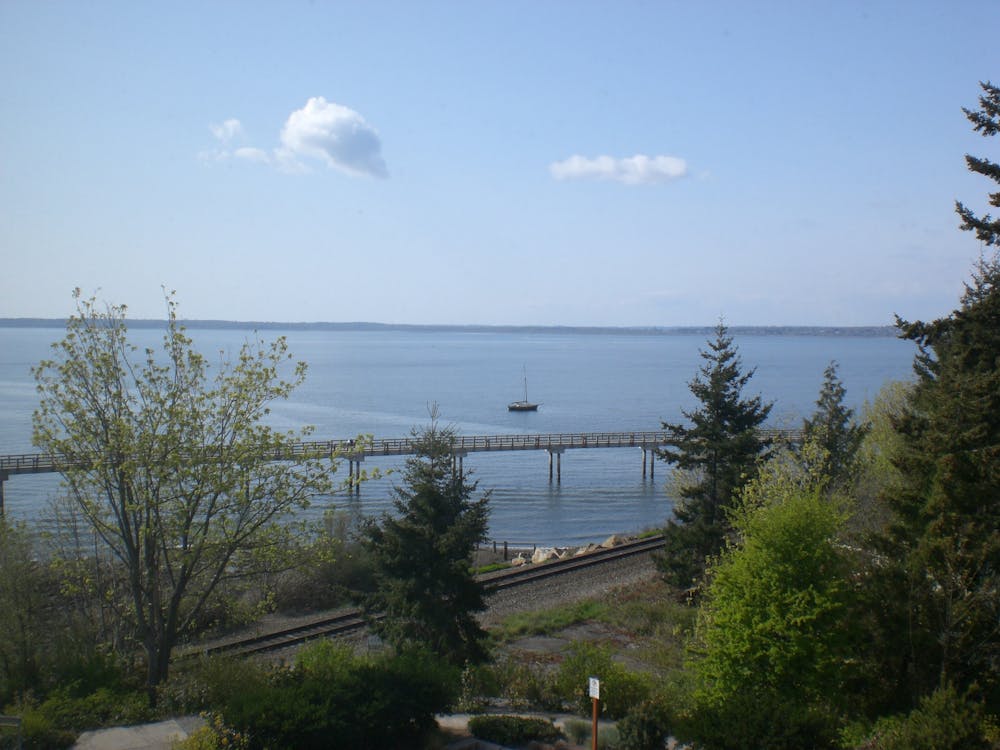Bellingham was unprepared for the heat wave that hit over the last week of June. When our average June high is around 65 degrees, it’s no wonder that most of us struggled with oppressive humidity and temperatures well above 90 degrees. Many Bellingham residents lack resources like air conditioning to help mitigate this kind of weather. This raises some concerns such as: What can we do to stay cool if we’re hit with another heat wave, and how can we do it on a college student’s budget?
In a public health news release posted to Whatcom County’s website on June 24, the Whatcom County Health Department recommended limiting outdoor activity, staying hydrated and soaking in cold water in the event of high temperatures. These were in line with the actions taken by Western Washington University student Kaitlyn Davidson.
“We tried to stay inside; I stayed with my boyfriend in the basement of his house,” Davidson said. “It was cooler down there. We also got a small pool for free off the side of the road and that helped a little.”
While these are likely similar in scope to the measures we were all taking — simple things like box fans over bowls of ice and opening windows at night — sometimes they’re not enough. What do we do when they aren’t sufficient?
Heat doesn’t affect everyone in our community equitably. According to the Environmental Protection Agency, extreme heat has a disproportionate effect upon not only children and the elderly, but also on those with limited personal resources such as students, people in the houseless community and other low-income groups.
There are a few options available that likely won’t break the bank, however. For those who lack any effective ways to cool their residence, avoiding excess heat is a necessity. Avoiding using a stovetop or slow cooker when possible is key, as they can further warm up your home. According to Darcie Hill, a wellness administrator at Western, people should try food options that require minimal heat to prepare.
“Doing food prep in the evenings or mornings when it is coolest would be the most comfortable,” Hill said via email. “Sticking to foods that don’t require baking or steaming is also helpful. For example, making a grain, bean, veggie salad to have on hand for a grain bowl, to top a salad, as a side, etc. Something like this is very versatile.”
Hill also discussed the importance of drinking water, adding that there are some foods that can contribute to proper hydration as well. “Incorporating veggies, fruit, and dairy will also provide additional hydration via their water content,” Hill said regarding the importance of maintaining a balanced diet even when limiting heat in the food preparation process.
While a change in diet isn’t always an option, meal preparation can be done early in the morning or late in the evening to help mitigate the extra heat cooking can produce. Small changes might not seem like a lot when it is almost 100 degrees out in a town that rarely sees the mid-80s, but they can make a major difference in keeping you cool. Perhaps more importantly, they don’t require a substantial change in schedule for people who may not be able to stop going about their daily lives because of a heat wave.
Avoiding cooking and hot foods aren’t the only ways to stay cool. In fact, there are ways to keep being active without exposing yourself to too much extra heat. Hill said it is safer to exercise by “sticking to lower intensity exercise like walking, yoga, meditation,” while avoiding strenuous forms of exercise when possible.
This is in line with the county Health Department’s own guidance, which suggests that outdoor activities should be limited to the coolest part of the day and punctuated by frequent rests if possible.
Higher temperatures are not the only thing Bellingham residents should be prepared for this summer. Scarlet Tang, a communications specialist at the Whatcom County Health Department, suggested that residents prepare themselves for smoke from wildfires in the region alongside higher temperatures going forward.
In another news release, the county Health Department suggests that residents should prepare for smoke by staying up to date on air quality in the region and by being equipped to spend more time indoors when possible. The Puget Sound Clean Air Agency has instructions on how to make a DIY air filter using a box fan for those who don’t have access to an air purifier or air conditioning with re-circulating capabilities.
“High temperatures affect plants as well as people, and hot weather dries out vegetation and makes it more prone to wildfires,” Tang said via email. “Last year's wildfire smoke caused hazardous air conditions in Whatcom County, and the time to get ready is now.”
Caleb Lyon (he/him) is the opinion editor for the Front this quarter. He is a fourth-year studying Medieval History with minors in Latin and Law, Diversity, and Justice. Caleb has a wide range of writing interests and is hoping to expand community submissions to the Opinion section during his time at The Front. In his free time, he can be found reading, visiting museums, or enjoying the outdoors. You can reach him at westernfront.opeditor@gmail.com.





